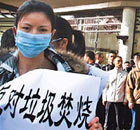Society
Restaurant bookings soar for Chinese Eve
By Bao Daozu (China Daily)
Updated: 2010-01-15 07:08
 |
Large Medium Small |
Families are frantically booking nianyefan, or Chinese Lunar New Year's Eve family dinners, at popular restaurants in Beijing and Shanghai.
As in previous years, restaurants in the capital serving traditional Beijing cuisine are most popular.
Bianyifang, famous for its Peking duck, is already 70 percent booked for Feb 13. The cost of a feast for a group of 10 is about 1,000 yuan ($146). "From what we are seeing, our nianyefan business this year will be as good as the last," said Luo Wei, a manager at Bianyifang.
Managers at Yijinyuan, one of the largest Muslim restaurants in Beijing, said 80 percent of available tables had been reserved for nianyefan and all the VIP rooms were booked. Some customers have reserved tables for lunch on the first five days of Chinese New Year.
Yijinyuan has no fixed menu for their banquet. Customers can choose their own meal as long as the group spends a minimum of 1,500 yuan. Prices can rise to 20,000 yuan a table ($1,750).
In Shanghai, nearly all high-end restaurants are fully booked for New Year's Eve. Big spenders are forking out an average of 2,000 yuan for a set dinner for a family of 10.
Xinxianghui, a Sichuan restaurant group in Shanghai, said its seven restaurants are fully booked for nianyefan.
Xinghualou, another restaurant that also expects a full house on New Year's Eve, is offering its loyal customers an option: take-out. The restaurant will package a whole dinner including four cold and eight hot dishes in special containers for customers to eat at home.
Nianyefan is traditionally served to a gathering of family members at home but cooking meals at home is not easy task.
Ding Yanjun, secretary to the general manager of an organization in Shanghai, said her family used to eat at home but the washing, cooking and tidying was a headache.
"Now all the 10 family members can gather at a restaurant close to our house and that really save us a lot of time and energy," Ding said.
Many families still celebrate the annual gathering at home.
Gu Yinghao, an air traffic controller at the Air Traffic Control Bureau of East China, said his family seldom had their dinner outside of the home.
"It's too much trouble to book a table on New Year's Eve and traffic jams are likely that night. Why not stay at home? It feels warm and cordial eating and chatting in a familiar environment," he said.
Chinese New Year's Day coincides with Western Valentine's Day this year but most traditional restaurants have shown no interest in tying the two together.











